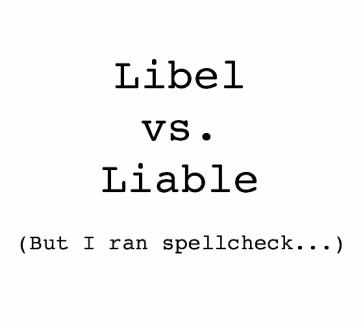
Do you know the difference between libel and liable? While reading a recent blog post, I found myself asking that question aloud to the author. The writer used the word libel when I'm pretty sure she meant liable. It's impossible to know, though, whether this was simply a typo or evidence of the writer's lack of vocabulary.
Liable means that you are responsible for something (as in legally liable to pay for a car accident) or likely to do something (as in being liable to spend too much money if you go shopping at the mall).
Libel is the act of writing or speaking about someone in a defamatory way that presents a false picture of that person and damages their reputation. (In other words, you lied and they suffered because of it.)
This is one of those typos that spellcheck won't catch. The spellchecker doesn't know which (perfectly legitimate) word you meant. That's why it's important to allow a little time between when you write and when you post. Let the copy sit for a while. Then go back and read through it with fresh eyes. You're more likely to see errors that way — errors that could turn away prospective readers of your work or buyers of your goods and services.
Do you confuse the meanings of words that sound the same? Do you know the difference in the meanings but find that you simply miss the mistake? Feel free to share your personal word demons in the Comments below.
If you have a writing, grammar or language question, please share it for consideration. If you would like to have The Write Stuff delivered to your inbox, please submit your email address via the box in the sidebar.
Liable means that you are responsible for something (as in legally liable to pay for a car accident) or likely to do something (as in being liable to spend too much money if you go shopping at the mall).
Libel is the act of writing or speaking about someone in a defamatory way that presents a false picture of that person and damages their reputation. (In other words, you lied and they suffered because of it.)
This is one of those typos that spellcheck won't catch. The spellchecker doesn't know which (perfectly legitimate) word you meant. That's why it's important to allow a little time between when you write and when you post. Let the copy sit for a while. Then go back and read through it with fresh eyes. You're more likely to see errors that way — errors that could turn away prospective readers of your work or buyers of your goods and services.
Do you confuse the meanings of words that sound the same? Do you know the difference in the meanings but find that you simply miss the mistake? Feel free to share your personal word demons in the Comments below.
If you have a writing, grammar or language question, please share it for consideration. If you would like to have The Write Stuff delivered to your inbox, please submit your email address via the box in the sidebar.


